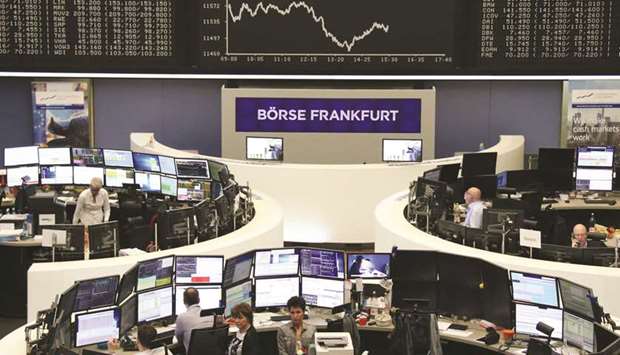The pound fell further as EU leaders met in Brussels yesterday to consider Britain’s request to delay Brexit, while equities pushed higher following the US Federal Reserve’s unexpectedly dovish message.
Sterling, seen as a barometer in Britain’s long-running Brexit saga, slid as fears that the country could crash out of the EU without a deal continued to fester.
British Prime Minister Theresa May was back in Brussels on a last-gasp mission to beg EU leaders for more time to deliver a Brexit deal that was twice rejected by her own parliament.
May declared that she is “determined” to deliver Brexit, after formally requesting a three-month delay on Wednesday.
However, investor fears persist that the 27 other EU leaders could refuse the request, potentially sending Britain crashing out of the bloc in just eight days’ time.
The pound, which started the day at nearly $1.32, fell as low as $1.3004 during the day.
“For the third time this week investors ignored solid UK economic data, distracted by Brexit drama,” said City Index senior analyst Fiona Cincotta.
UK retail sales rose 0.4% in February from the previous month, official data showed, showing that shoppers haven’t been frightened off from making purchases by Brexit.
However the Bank of England expressed concern that further “uncertainties” over a “cliff-edge” no-deal Brexit “could have a significant effect on spending” by businesses.
As expected, it held its main interest rate steady at 0.75%.
Meanwhile, equities wobbled in Europe as investors reflected about the US Federal Reserve’s dovish shift on Wednesday.
In Europe, London’s FTSE 100 gained 0.9% to 7,355.31 points, Frankfurt’s DAX 30 lost 0.5% at 11,549.96 and Paris’s CAC 40 was down 0.07% at 5,378.85 at close yesterday.
It forecast that it would not raise US borrowing costs this year – compared to its earlier projection of two hikes – and cut its annual growth outlook.
A slower growth outlook is bad for stocks as companies have dimmer perspectives for sales and profits.
But the perspective of interest rates remaining low for longer means businesses have lower borrowing costs.
“Low inflation, ongoing stimulus and a recognition of the risks facing the US economy have proved to be an ideal environment for equities,” said Chris Beauchamp, chief market analyst at online trading firm IG.
In the US, stocks pushed higher after opening in the red, with iconic jeans company Levi’s making a hot return to Wall Street.
Its shares surged more than 30% to $22.22 above its IPO price in opening trade on the New York Stock Exchange.

Traders work at the Frankfurt Stock Exchange. The DAX 30 lost 0.5% to 11,549.96 points yesterday.
